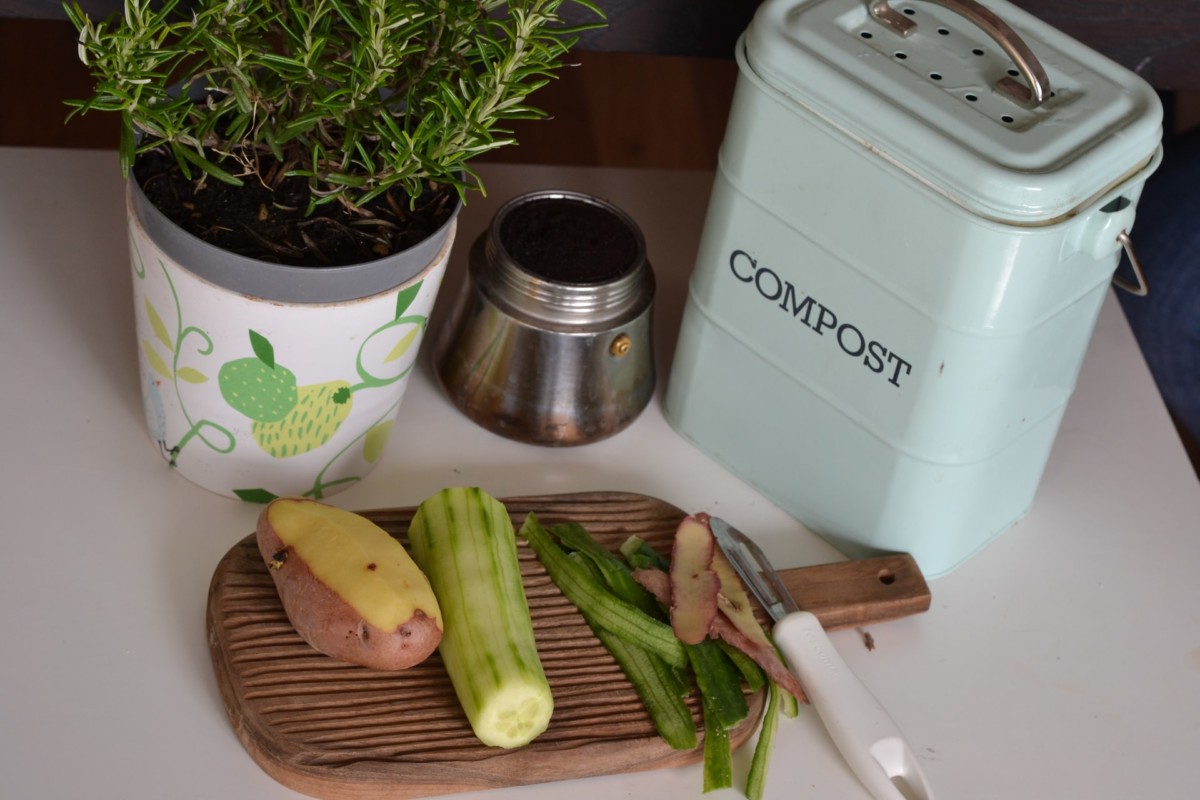Switching to greener alternatives is a great way to live a sustainable life, especially with Earth Day approaching. There are many ways to be environmentally cautious while living in an apartment.
Most apartment complexes offer compost and recycling bins and there are many alternatives to things you use every day. To help you get started, we reached out to green experts to share their tips on how to live a sustainable lifestyle in an apartment. So whether you’re trying to live a more environmentally friendly life in your apartment in Boulder, CO, or your studio in New York, NY, read on to see what they had to say.

1) Ways to recycle when your apartment doesn’t offer the service
About 20 billion plastic water bottles wind up in landfills each year or are incinerated. Recycling those plastic bottles and aluminum cans helps the environment, and in some states like California, put some cashback in your pocket. Some apartment complexes don’t have separate recycling available for the residents so recyclable items end up in the trash and ultimately, in the landfills. Here are a few ways to recycle if your apartment complex doesn’t offer to recycle.
- Contact companies to pick up your cans and bottles from your door.
- Walk your recyclables down separately if your building has a designated recycling room.
- Ask friends who have access to curbside recycling if you could bring the recycling with them.
- Bring your recycling to a drop point or recycling center.
- Ask your landlord to get curbside recycling or set up a recycling area and get signatures from other people in your building.
- Bring it to work and use the office recycling pick up.
2) Be conscientious of where you live
Transportation has a big environmental impact, so choosing where to live can be a really important moment in your sustainability journey; it’s your opportunity to design a life where you can walk and bike more and drive less. Here’s a fun exercise I like to use when shopping for a new house or apartment:
- Grab a map and draw dots on the map to mark the places you need to visit often (for example, your work, the kids’ schools, your favorite grocery stores, restaurants, coffee shops, the public library – whatever is most important to you). Hopefully, these are clustered in one area of the map. If not, start with the most important cluster and repeat this exercise multiple times.
- Use a string and a pencil to draw two circles, with your cluster of dots at the center; one that represents 1 mile and another that represents 3 miles; you should, of course, choose distances that feel right to you and your walking/biking lifestyle. If public transportation is an option, draw a third circle to represent your reasonable commute on public transportation.
- These circles represent the best areas for you to live. If you had to do this for multiple clusters, look for overlapping circles that will allow you to live in one place, yet walk, bike, or take public transportation to your most important/frequent destinations.
3) Planning is a crucial part of a sustainable lifestyle
There are so many fantastic tips for reducing food waste from adding kitchen rolls to your bags of salad leaves extending their freshness by up to 4 days to keeping your spring onions in a glass of water and placing them near your kitchen window – this allows you to clip them as you need them and have them grow back in between. But the most important thing is ‘Planning’, plan your meals for the week in advance of going shopping. Then check what food you currently have and after that only buy what you need for the planned meals. Lastly, the freezer is your friend. If you have too much food, freeze it instead of letting it go to waste. – Foodie Save
4) Composting companies can aid you on your journey
Managing your own composting system in an apartment can be difficult. Some companies provide a 5-gallon bucket with an easy-to-remove, but tight sealing lid for you to store your food scraps, and empty the bucket for you on a weekly or every-other-week basis. – Circle Compost
5) Simple switches can make a big difference
We believe you don’t have to switch up your entire life to live more sustainably in an apartment. Simple swaps like replacing your shower head for a water-saving version, switching out your soap products for low/zero waste alternatives, or starting a worm composting bin on your patio for your food waste can all make apartment living a little greener. By being informed consumers and utilizing our purchasing power in sustainable ways, we can co-create a healthier, more abundant planet. – Heal the Planet
6) Use reusable food wraps to preserve leftovers
Use reusable food wraps for long-lasting produce. Learn veggie revival tips, recipes that preserve or celebrate seasonal favorites, and how to cultivate a scrappy kitchen ecosystem that alchemizes trash into treasure – like turning a freezer full of peels into stock, excess herbs into pesto, leftover berries, and kale into smoothie cubes, the last of this-n-that into salad dressing. Whatever your imagination dreams up to rise to the challenge of no leaf left behind. – Z Wraps

Photo courtesy of Z Wraps
7) Be mindful of your surroundings and ‘unplug’
We believe living a more sustainable life means being more aware of the entire energy ecosystem around you, and making little decisions that can have a big impact. This can be as simple as ‘unplugging’ literally and figuratively. For example, designate a special time of each day (or week) and commit to shutting off smartphones, computers, and the TV to enjoy some low-tech time out. Shutting down over time adds up. Chargers, even without being attached to a phone or device, still draw between 0.1 and 0.5 watts per hour. – Pink Energy
8) Keep your compost and plants bug-free
We understand that keeping things sustainable and hassle-free isn’t always easy, so take advantage of their simple sustainable solutions to common problems: Pest products can tackle fruit flies for those kitchen composters out there. – Aunt Fannie’s
9) Switch to eco-friendly kitchen accessories
Each of us has a moral responsibility to be environmentally friendly by reducing waste and conserving our planet’s precious resources. One simple solution is to get rid of the single-use plastic products and switch to compostable products in your kitchen. You can start by using eco-friendly dinnerware such as plant-based cups, plates, straws, and cutlery composting help break down organic materials and turn them into rich soil, without harming the environment with chemicals or filling up the landfills. – Greenchain Compostables
10) See if your building provides EV charging equipment
Your apartment is a reflection of you, like your commitment to a sustainable lifestyle and your decision to drive an electric vehicle. Make a statement by living where that commitment is shared by your fellow residents and building owners too. Look for EV charging equipment and talk to the building management about valuable utility incentives and potential carbon credits for adding charging. – Tracy K. Price, CEO of Qmerit.
11) Reduce your plastic waste with biodegradable bags
We feel one of the best ways to live a sustainable apartment life is to reduce your plastic waste by looking for re-usable plastic products or non-plastic products, recycle what can’t be reused, look for products with the least amount of wasteful packaging, and supporting companies with a sustainable environmental mission. And when you do throw away garbage use biodegradable bags. – BagUps
12) Be an eco-conscious consumer
Limited space in apartment living can be a real struggle. For anyone pursuing a sustainable lifestyle, my advice is to adopt the mindset of an eco-conscious consumer. This mindset begins by minimizing your possessions. It’s easier to get organized when you get back to the basics, plus life gets simpler. You would be amazed how uncluttered the mind can become just by decluttering the physical space surrounding you. Next, when shopping and acquiring new possessions, commit to donating one or two items for every new thing you bring into your space. This mindset will help you choose quality over quantity and think before buying. – ECO CRATES of America
13) Support renewable energy
Whether you rent or own an apartment, anyone can easily reduce their carbon footprint by supporting renewable energy from sources that replenish themselves naturally — like wind, water, sun, or forests. There can be affordable ways to reduce your environmental impact. In states like Maine, you are able to support renewable energy by matching your electricity use with no-emission 100% Maine-made clean energy. – Maine Green Power
14) Beware of the “phantom” energy use
Did you know that many appliances and electronics use “phantom” energy even when they’re turned off, costing the average home around $200 in extra annual energy costs? Common culprits include computer monitors, printers, game consoles, and laptop chargers. Cut that wasted standby energy by unplugging any electronics not in active use. If you live in a region with “time of use” energy pricing, try to take advantage of off-peak pricing, for instance, by waiting until after 9 pm to charge your devices. – Acterra

 United States
United States Canada
Canada